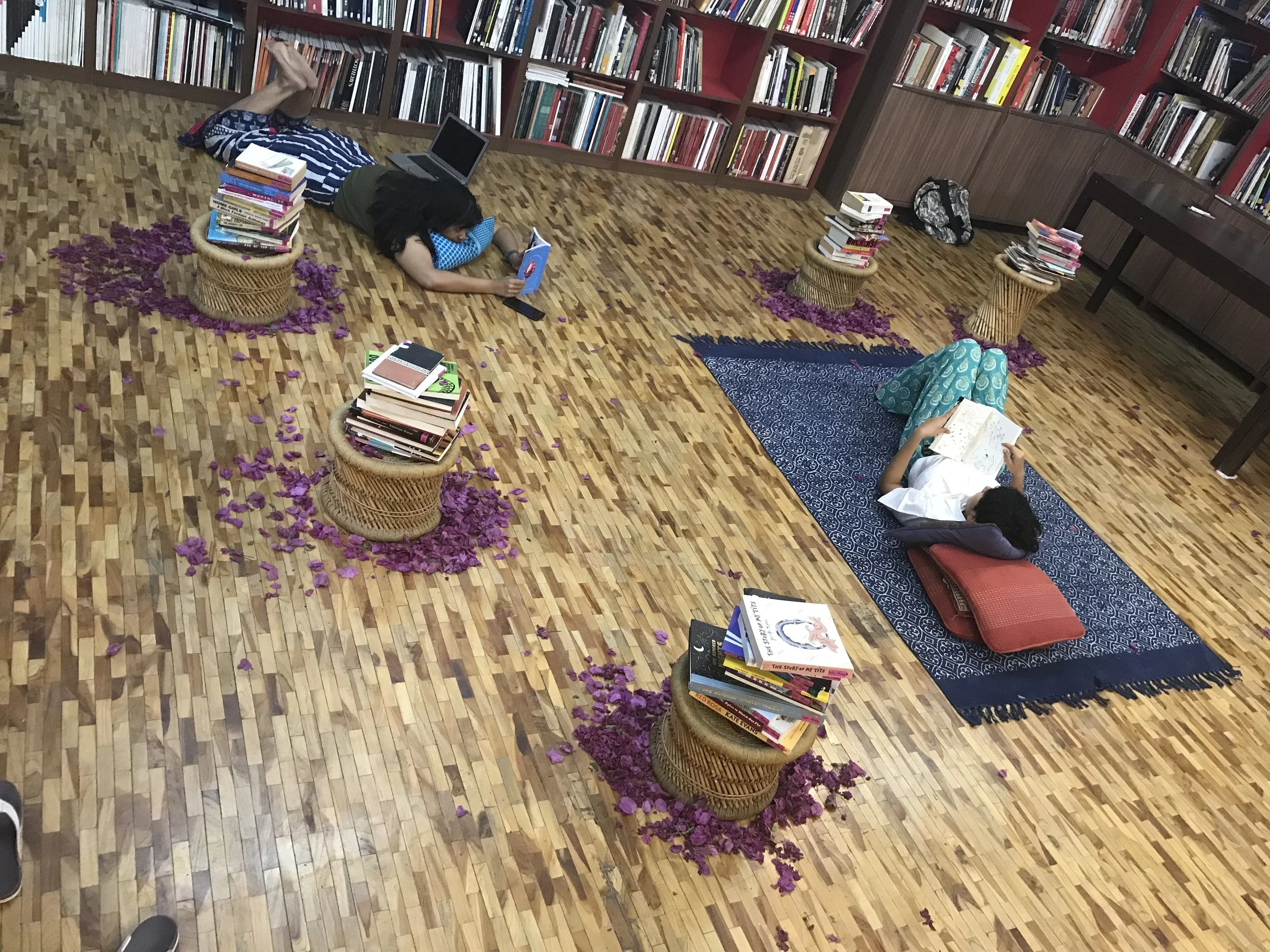Dhaka Art Summit 2018
Himali Singh Soin and Garima Gupta’s participation at the Dhaka Art Summit 2018 was supported by the Foundation.
Himali Singh Soin
Munim Wasif- prints from Diana Campbell Betancourt’s Bearing Points
The Dhaka Art Summit was like a journey that really shifted the centre of artistic progress from the western world to the South Asian region, and then grasped at a kind of trans/internationalism that in this populist climate, was not only much needed, but showed that it has existed before and is very possible again. It was inspiring, educational and most of all, generous in ideas and in hospitality.
Though an artist in last years' summit (part of Nada Raza's The Missing One), I was unable to attend the 2016 edition. This year, I attended the summit in the capacity of a writer and was thrilled to find artworks that merged my two interests: ecological/interstellar metaphors and poetic text employed in innovative and inspiring ways.
One of this year’s highlights were: the Otolith Group's performance lecture on the trees—a poetics of the soil—of Shanti Niketan, inspired by Tagore and an aspiration to a multi-naturalism as opposed to a multi-culturalism. Their discussion on the lecture-performance as an art form was revelatory, a medium that enables the activation of historical material that is trans-temporal; a form of time-travel. Since my own artistic practice utilises the lecture-performance, it helped me think about using the medium as a way to sift through raw material, and as the performance begins to inhabit a life of its own, to turn an idea into a dramatised personae in order to test it out, to learn from your own characters.
Rising Oceans and Conflict TBA21-presentation
Through the shows—Vali Mahlouji’s A Utopian Stage in particular—it was reaffirming to see that cultural production has always been subversive, has always inspired a social atmosphere of conversation, rebellion and a political imagination. I imagined Cunningham and Shankar together in Tehran and the (wine and) ideological exchanges that might have resulted. If this were the case, then DAS itself becomes a salon of sorts. Isolated in precarious Dhaka, I had stimulating conversations into the wee hours of the night. My favourite was meeting from a dancer with the Merce Cunningham company, a profound person, and a sailor on a ship, exploring the oceans through art.
As I am in the throes of research on the polar circles, I returned to my studio to re-orient my current book. The poles were no longer at the poles. The map is a mess. The melting poles, with their fragile beauty, their infinite mystery and their entangled geopolitics, are right here, in the global south.
I would like to thank the Inlaks Foundation for supporting this immense experience.
Garima Gupta
Desmond Lazaro - notebook from Planetary Planning' curated by Devika Singh
The geographic nomenclature Asia-Pacific unwittingly clubs a large stretch of varied identities into one mass. I believe this was untangled and then re-imagined in an exceptionally mindful manner at the Dhaka Art Summit this year. Among the exhibits that really opened up a new world of artistic possibilities for me were Sharmini Pereira’s One Hundred Thousand Small Tales, Diana Campbell Betancourt’s Bearing Points and Cosmin Costinas’ A Beast, A God and A Line.
Education Pavilion
Geographical and political positioning of the Summit in Bangladesh also re-oriented many global conversations and time-sensitive debates which otherwise tend to lose context. Rising Oceans and Conflict was one such talk where artists, architects and curators reflected upon the much debated ‘2°C’ increase in global temperature and its effects for a delta region such as Bangladesh. And as an extension, the role of artist and imagination in times of such conflicts.
Ines Doujak- Archival research project from Cosmin Costinas’ A Beast, A God and A Line
Personally, a great avenue for learning was the Summit’s Critical Writing Ensemble - Sovereign Words. Over a period of six days, writers, performers, curators and artists from different indigenous communities shared ideas and practices which are claiming independence from the formally accepted and celebrated Western modernist thought canon. It felt like a much needed exercise for devising a way forward for the arts, especially in Southeast Asia.
I am greatly indebted to the DAS team and Inlaks Foundation for giving me the opportunity to experience the 2018 Summit at Dhaka.
All images are courtesy Garima Gupta.
Title image: Harano Sur- Reetu Sattar











